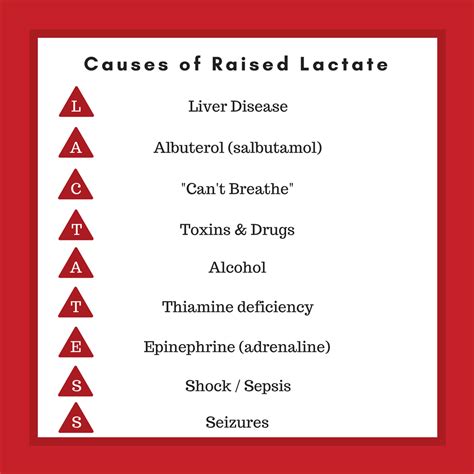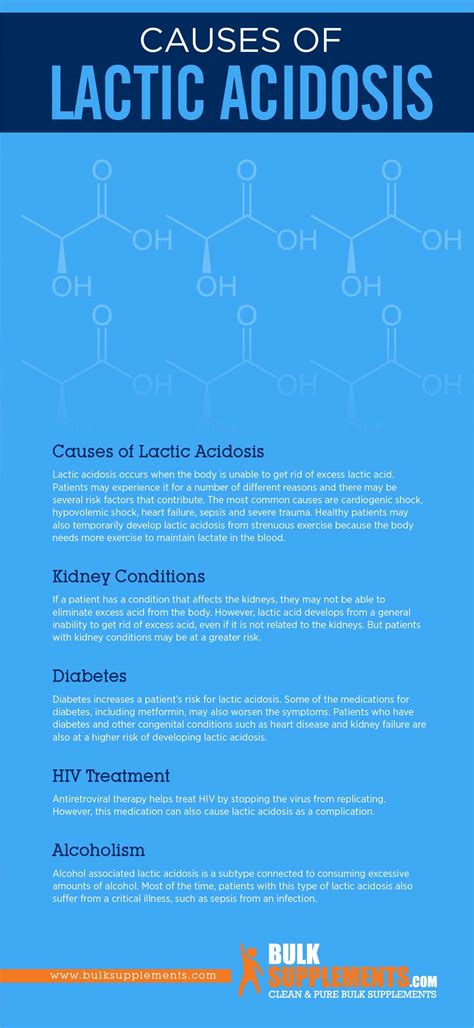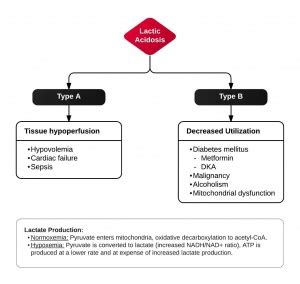Intro
Elevated lactic acid levels can cause fatigue, muscle cramps, and respiratory issues. Discover the causes, symptoms, and effects of high lactic acid, including metabolic disorders, intense exercise, and sepsis, and learn how to manage and treat this condition.
Elevated lactic acid levels in the body can be a sign of an underlying health issue that requires prompt medical attention. Lactic acid is a naturally occurring compound that is produced when the body breaks down carbohydrates for energy. However, when the body's ability to utilize oxygen is impaired, it can lead to an accumulation of lactic acid, causing a range of symptoms and health problems. In this article, we will delve into the causes and symptoms of elevated lactic acid levels, as well as discuss the importance of seeking medical attention if you are experiencing any of these symptoms.
The human body is a complex system that relies on a delicate balance of various chemical compounds to function properly. Lactic acid is one such compound that plays a crucial role in the body's energy production process. When the body is functioning normally, lactic acid is produced and utilized by the muscles and other organs without any issues. However, when the body's ability to utilize oxygen is impaired, either due to a medical condition or physical exertion, it can lead to an accumulation of lactic acid. This can cause a range of symptoms, from mild to severe, and can even be life-threatening if left untreated.
Elevated lactic acid levels can be caused by a variety of factors, including intense physical activity, certain medical conditions, and medications. For example, athletes who engage in high-intensity sports may experience elevated lactic acid levels due to the intense physical exertion. Similarly, individuals with certain medical conditions, such as diabetes, heart disease, or respiratory problems, may also experience elevated lactic acid levels. Additionally, certain medications, such as metformin, can also cause elevated lactic acid levels as a side effect. It is essential to be aware of these potential causes and to seek medical attention if you are experiencing any symptoms of elevated lactic acid levels.
Elevated Lactic Acid Causes

Medical Conditions That Can Cause Elevated Lactic Acid Levels
Certain medical conditions can increase the risk of elevated lactic acid levels. These conditions include: * Diabetes: Individuals with diabetes are at a higher risk of developing elevated lactic acid levels due to the body's impaired ability to regulate blood sugar levels. * Heart disease: Heart disease can impair the body's ability to utilize oxygen, leading to elevated lactic acid levels. * Respiratory problems: Conditions such as chronic obstructive pulmonary disease (COPD) can impair the body's ability to utilize oxygen, leading to elevated lactic acid levels. * Liver disease: Liver disease can impair the body's ability to remove lactic acid from the bloodstream, leading to elevated levels.Elevated Lactic Acid Symptoms

Severe Symptoms of Elevated Lactic Acid Levels
In severe cases, elevated lactic acid levels can cause life-threatening symptoms, including: * Respiratory failure: Elevated lactic acid levels can cause respiratory failure, which can be life-threatening if left untreated. * Cardiac arrest: Elevated lactic acid levels can cause cardiac arrest, which can be life-threatening if left untreated. * Coma: Elevated lactic acid levels can cause coma, which can be life-threatening if left untreated. * Death: In extreme cases, elevated lactic acid levels can cause death if left untreated.Treatment Options for Elevated Lactic Acid Levels

Prevention Strategies for Elevated Lactic Acid Levels
Preventing elevated lactic acid levels requires a combination of lifestyle changes and medical interventions. Some prevention strategies include: * Staying hydrated: Drinking plenty of water can help to prevent dehydration and reduce the risk of elevated lactic acid levels. * Eating a healthy diet: Eating a diet that is high in nutrients and low in sugar can help to reduce the risk of elevated lactic acid levels. * Exercising regularly: Exercising regularly can help to improve cardiovascular health and reduce the risk of elevated lactic acid levels. * Managing underlying medical conditions: Managing underlying medical conditions, such as diabetes and heart disease, can help to reduce the risk of elevated lactic acid levels.Conclusion and Next Steps

We invite you to share your thoughts and experiences with elevated lactic acid levels in the comments section below. If you have any questions or concerns, please do not hesitate to reach out to us. Additionally, if you found this article informative and helpful, please share it with your friends and family to help raise awareness about the importance of managing elevated lactic acid levels.
What are the common causes of elevated lactic acid levels?
+Elevated lactic acid levels can be caused by a variety of factors, including intense physical activity, certain medical conditions, and medications. Some common causes include diabetes, heart disease, and respiratory problems.
What are the symptoms of elevated lactic acid levels?
+The symptoms of elevated lactic acid levels can vary depending on the underlying cause and the severity of the condition. Some common symptoms include muscle pain and cramping, fatigue, shortness of breath, nausea and vomiting, and abdominal pain.
How can elevated lactic acid levels be treated?
+Treatment for elevated lactic acid levels depends on the underlying cause and the severity of the condition. Some common treatment options include medications, oxygen therapy, fluid replacement, and dietary changes.
Can elevated lactic acid levels be prevented?
+Yes, elevated lactic acid levels can be prevented by making lifestyle changes and managing underlying medical conditions. Some prevention strategies include staying hydrated, eating a healthy diet, exercising regularly, and managing underlying medical conditions.
What are the complications of elevated lactic acid levels if left untreated?
+If left untreated, elevated lactic acid levels can cause serious complications, including respiratory failure, cardiac arrest, coma, and death. It is essential to seek medical attention promptly if you are experiencing any symptoms of elevated lactic acid levels.
